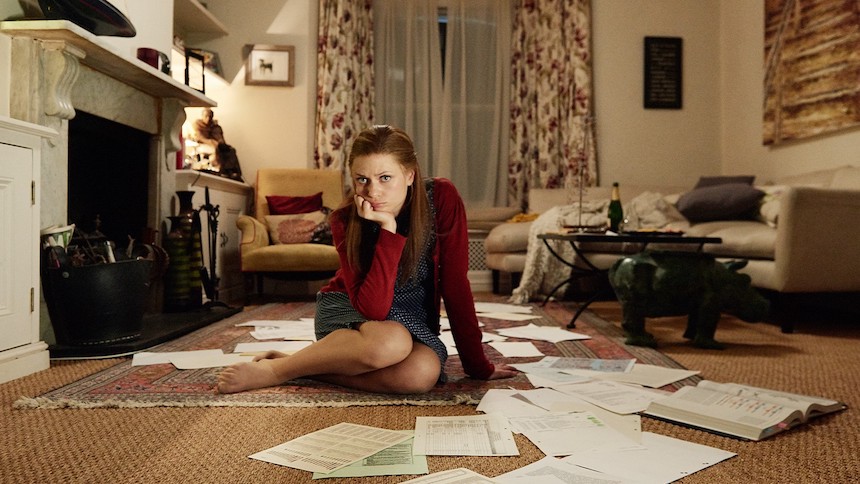Review: LOVE TYPE D, Lo-Fi Sci-Fi Rom-Com for the Rest of Us

After circulating amongst and betwixt multiple international film festivals, virtual and analog, over the better part of a pandemic year, writer-director Sasha Collington’s (Lunch Date, Four Eyes) remarkably self-assured feature-length debut, Love Type D, a romantic comedy with a lo-fi, sci-fi twist (among one or two others), arrives quietly on digital shores.
Given the veritable influx of streaming titles, VOD, and theater reopening, chances are that Love Type D will get lost in the proverbial shuffle, to be randomly discovered and perhaps even appreciated by the equivalent of channel-surfing viewers over the next few weeks or even months.
If nothing else, Love Type D serves as a calling card or sizzle reel for Collington and her filmmaking career. Setting a dry, drolly twee tone within the first few seconds, Love Type D centers on Francesca “Frankie” Brown (Maeve Dermody), a thirty-something office worker in or around London with a decidedly bad run of luck with men.
As we soon learn, Frankie has always been the “dumpee,” never the “dumper,” suffering a humiliating, soul- and heart-crushing series of romantic defeats trailing back to her preteen years. It’s enough to make a sensitive, somewhat egocentric young woman doubt herself and doubt whether she’ll find socially approved and defined happiness in a monogamous, heterosexual relationship before she turns fifty and her life effectively ends.
Frankie’s latest romantic failure, Thomas (Oliver Farnworth), a smug, self-involved, generically handsome type with perpetual days-old stubble, a cushy, well-paying job of indeterminate origin or definition, and a two-decades-younger half-brother, Wilbur (Rory Stroud), eager to step in as Thomas’s factotum when needed. Thomas uses Wilbur, a precociously cheeky, 11-going-in-30 boy genius (at least in his own mind), to dump Frankie in humiliating fashion at a swank restaurant.
It’s cleaner and neater for Thomas, but it leaves Frankie, obsessed with romance and her lifetime 0-12 record, without closure or even much (common) sense as to how to deal with the long-foregone failure of her latest non-conquest. And without another potential romantic partner in sight, an unfulfilling day job as a low-level office worker (something to do with instruction manuals), and signs of happy couples all around, Frankie seems set on a self-destructive path.
When stalking Thomas proves fruitless, Frankie turns her attentions to Wilbur, persistently prodding Wilbur to help her with Thomas. He doesn’t. Instead, Wilbur puts Frankie onto the “Love Type D” of the title: A supposedly newfound gene that determines whether dating-age adults will be dumped or the dumper.
It sounds too good, too easy, and too simple to be true, but it’s a testament to Collington’s skill with dialogue, character, and situation that audience buy-in is almost immediate, especially with Dermody, a charmingly winsome onscreen presence, delivering Collington’s dialogue and turning Frankie, a potential stalker blinded by social expectations and personal anxieties, into an easily relatable, sympathetic character.
While Frankie naturally functions as the central character and protagonist, Wilbur serves as something of a guide or mentor, prodding Frankie to confirm his suspicions about her negative gene status by visiting the company, Epigenetica, promoting the possibly revolutionary, if non-peer-reviewed, idea, and when that semi-fails, finding a way to obtain test kits for herself and her equally bad-at-romance co-workers. Everyone, it seems, wants an excuse, any excuse for abdicating responsibility for their romantic failures that doesn’t involve personal failings, mistakes, or behavior modification.
Wilbur also comes up with the equally outrageous, farcical idea that Frankie and her co-workers can undo years of romantic disappointment by tracking down their ex-lovers, somehow convincing them to date again, and then promptly dumping them. That idea sends Frankie on a High Fidelity-inspired search into her romantic past, but everything eventually circles back to Thomas, Frankie’s ideal, idealized man, and the newly perfect life he’s already carved out with Cecilia (Alexandra Evans), an actual living, breathing astronaut. In short, she's "better" than Frankie in every socially and culturally approved way.
Collington keeps the mood and tone light throughout, only misstepping when she introduces a potential date for Frankie, Roland (Dan Starkey), who’s both shorter than Frankie and folliclely challenged, as a figure of mockery and fun for the audience. Even when Frankie’s behavior continues on its self-destructive path (i.e., stalking taken to in-film humorous heights), we never lose sight of Frankie’s conflicted emotional life or the journey Collington sets out for Frankie that sets aside the usual romantic-comedy cliches for something slightly deeper, if not exactly more profound: self-realization and self-acceptance.
Love Type D is available as of today on VOD.
Love Type D
Director(s)
- Sasha Collington
Writer(s)
- Sasha Collington
Cast
- Natacha Basset
- Sarah Bauer
- Lucy Bayler







